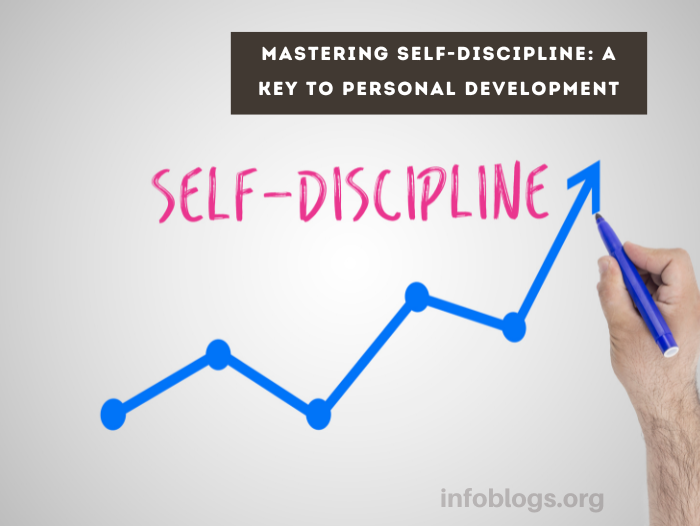Mastering Self-discipline is a crucial factor in personal development and achieving our goals. It serves as the foundation for success. Once we master self-discipline, we gain control over our actions, habits, and ultimately, our lives. This article will delve into the significance of self-discipline in personal growth and offer practical techniques to develop this vital attribute.
Understanding Self-Discipline:
The capacity to maintain focus on long-term objectives by managing one's impulses, emotions, and actions is known as self-discipline. It entails deliberately selecting actions that are consistent with our principles and priorities, even when we encounter distractions, enticements, or obstacles. By practicing self-discipline, we elevate our self-restraint, perseverance, and efficiency.
Setting Clear Goals:
Having a clear direction is essential for self-discipline to flourish. It is crucial to define your goals with precision and specificity, including both short-term and long-term objectives, and breaking them down into actionable steps. When you have a strong vision and a well-thought-out roadmap, it becomes simpler to prioritize tasks and make disciplined choices that bring you closer to your goals.
Cultivating a Growth Mindset:
To build self-discipline, it is crucial to adopt a growth mindset. This means accepting that your skills and intellect can improve with hard work and persistence. Instead of seeing difficulties as roadblocks, view them as chances to learn and develop. When you have a growth mindset, failures become valuable lessons, and you are better equipped to stay focused and disciplined when faced with challenges.
Creating Effective Habits:
Our lives are molded by our habits, which greatly influence our self-discipline. To achieve personal development goals, it is important to recognize the habits that aid in them and work on developing them. Begin with one habit and gradually gain momentum. Whether it's waking up early, exercising regularly, or practicing mindfulness, repetition of the habit will cement it and enhance your self-discipline.
Managing Time Effectively:
Efficient use of time is a key element in self-control. Arrange tasks in order of their significance and immediacy. Segment your day into periods of concentrated effort and steer clear of diversions like excessive use of social media or aimless browsing. Establish deadlines and adhere to them. By making the most of your time, you establish a structured atmosphere that cultivates productivity and self-control.
Developing Accountability Systems:
Self-discipline can be effectively strengthened through accountability. You can either team up with an accountability partner or become a member of a community that comprises individuals with similar objectives. Consistently keeping tabs on one another, setting benchmarks, and taking responsibility for one's progress are all crucial elements of this process. The presence of external accountability further bolsters one's self-discipline by providing an additional layer of commitment and motivation.
Overcoming Procrastination:
Self-discipline and procrastination are natural enemies. To conquer procrastination, it is essential to recognize the root causes and tackle them. Divide tasks into smaller, more manageable pieces, and concentrate on beginning the process. To allocate dedicated periods of focused work, use time-blocking techniques or the Pomodoro Technique. By confronting procrastination directly, you will enhance your productivity and self-discipline.
Practicing Self-Care:
It is important to understand that self-discipline does not necessarily mean denying oneself. It is crucial to prioritize self-care in order to maintain a healthy mindset and sustainable discipline. This includes getting sufficient sleep, consuming nutritious meals, and participating in activities that bring happiness and relaxation. By taking care of both your physical and emotional well-being, you can renew your energy and enhance your ability to consistently practice self-discipline.
Embracing Failure and Learning:
Personal development involves failure which cannot be avoided. Instead of considering it as a measure of your value, accept it as an opportunity to learn. Whenever you face setbacks, examine the reasons, learn from them and modify your strategy. By having a mindset that focuses on growth, failures can become a means to improve yourself, strengthening your determination and ability to recover.
Celebrating Progress:
It is important to acknowledge and celebrate the milestones you reach during your personal development journey. Even small achievements should be recognized. Celebrating progress can enhance your motivation and reinforce your self-discipline by highlighting the positive results of your hard work.
Conclusion:
The path to personal growth and accomplishment involves embarking on a transformative journey of self-discipline. This entails establishing definite objectives, fostering a mindset of growth, developing effective routines, managing time prudently, and prioritizing self-care. By embracing challenges, remaining dedicated, and allowing self-discipline to serve as a guiding force, you can take charge of your life and witness significant progress.


